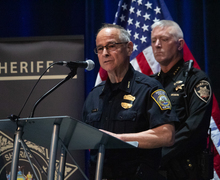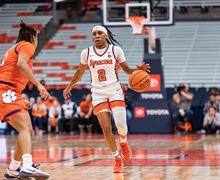Examining the appeal process as 15-day deadline approaches for Jim Boeheim, Syracuse
Chase Gaewski | Staff Photographer
Daryl Gross, Syracuse's director of athletics, and the rest of SU have until Saturday to appeal the penalties delivered by the NCAA earlier this month.
When the NCAA released its report on Syracuse University and handed down penalties to the school’s athletics’ teams March 6, the university was given 15 days to decide whether it would appeal the sanctions.
“The University is considering whether it will appeal certain portions of the decision,” said Chancellor Kent Syverud in a campus-wide email on March 6. “Coach (Jim) Boeheim may choose to appeal the portions of the decision that impact him personally. Should he decide to do so, we would support him in this step.”
If Boeheim appeals his nine-game suspension, which ESPN’s Andy Katz reported on March 6 that he would, or the university appeals part of the NCAA’s ruling, they’ll do so to the Infractions Appeals Committee.
Who sits on the committee? What does it take to get the initial ruling changed? How long will it take to find out the result of an appeal? Here are all those questions, and more, answered.
Who will sit on the Infractions Appeals Committee?
Five members sit on the Division I Infractions Appeals Committee. The group is composed of representatives from the membership and general public, according to NCAA.org, and the reps from the membership require conference- or school-level experience. Here are the five current members of the committee:
W. Anthony Jenkins, attorney, Dickinson Wright PLLC in Detroit — Jenkins is the chief diversity officer for Dickinson Wright, and his areas of practice include municipal law and finance, real estate and leasing.
David Williams II, athletic director and vice chancellor for athletics and university affairs, Vanderbilt University — Williams is a professor of law at VU, and he’s written and lectured on the topics of tax law, sports law, law and education and legal history.
Susan Lipnickey, faculty athletics representative, Miami University (Ohio) — Lipnickey is an associate professor in MU’s School of Education, Health and Society, and her areas of practice include criminal law and estate planning, among others.
Patricia C. Ohlendorf, vice president of institutional relations and legal affairs, University of Texas at Austin — Ohlendorf is the vice president for legal affairs at UTA and oversees 11 others in the university’s legal affairs department.
Jack H. Friedenthal, professor of law, George Washington University — Friedenthal joined GWU’s Law School in 1988, and has been a “special master” in multiple major federal cases including ones between the NFL and the Football Players Association.
What will it take for Boeheim to get the ruling reversed?
Boeheim and Syracuse must prove one of the following, according to NCAA.org, in order for the Infractions Appeals Committee to reverse or modify a ruling:
1) The ruling by the committee on infractions was clearly contrary to the evidence
2) The individual or school did not actually break NCAA rules
3) There was a procedural error that caused the committee on infractions to find a violation of NCAA rules
4) The penalty was excessive
If Boeheim does appeal, how long will it take to find out the result of the appeal?
NCAA.org states, “The membership-approved process spells out a 110-day timeline, but it may take longer depending on the complexity of the case.” The site also emphasizes the desire to make the most fair judgement, not the quickest.
The NCAA took 126 days after the Committee on Infractions held a hearing in Chicago to announce the sanctions it would levy on SU. Normally, 30–60 days are required to release the findings after a Committee on Infractions hearing.
What is the format of an appeal?
For a hearing to be in-person, per NCAA.org, the school or individual must have appeared in-person before a Committee on Infractions, which Boeheim and others from the university did.
The site states, “The process calls for the appellants, the involved committee on infractions and the NCAA enforcement staff to submit written information before the committee deliberates.”
The hearing in front of the Infractions Appeals Committee is the only round of appeals. The appeals committee doesn’t weigh any evidence not presented in front of the Committee on Infractions, and the two committees don’t share any members.
Published on March 16, 2015 at 1:42 am
Contact Matt: [email protected] | @matt_schneidman




